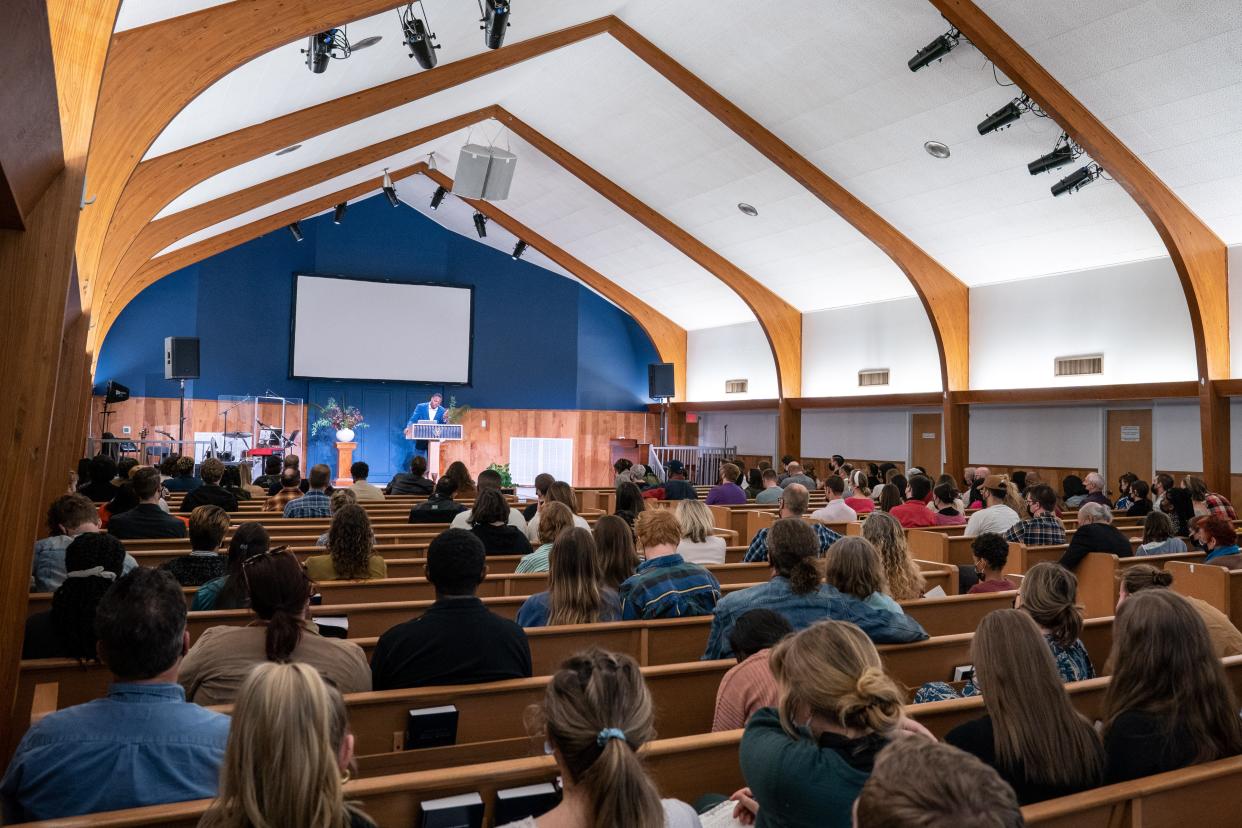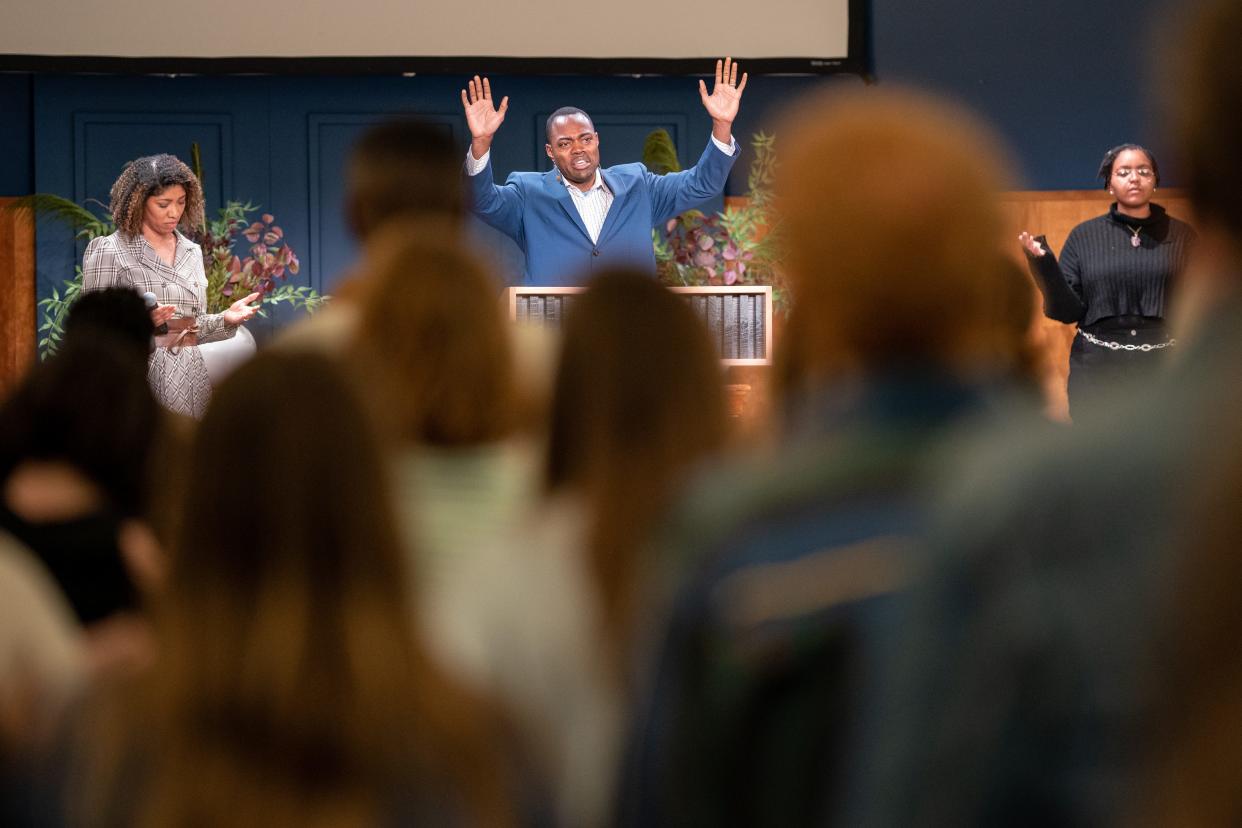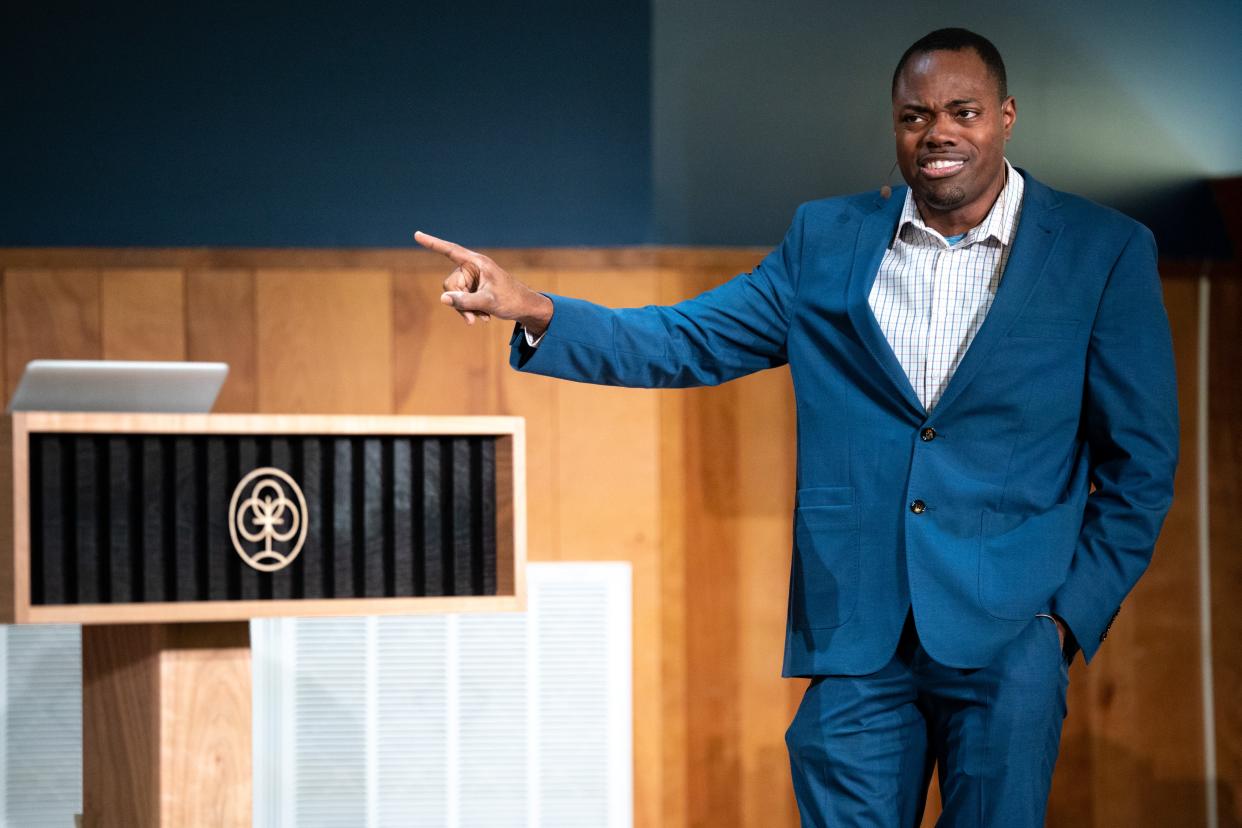How the role of women in ministry helped one Nashville church change denominations
Brandi Kellett long sensed she had a gift for leading ministry, but the church she calls home didn't fully affirm her ability to do that — at least until last month.
"It was profound," Kellett said. "For God to give me this gift of a community where all of the things that I suspected were planted in me nurtured."
Kellett's church is Koinonia in Nashville's Bordeaux neighborhood. She serves as the English department chair at Lipscomb University, hosts a Bible study in her home and led a Sunday school course at her previous church. But it was only due to a recent change in Koinonia’s denominational affiliation that Kellett could step up into a more formal leadership role at the congregation.

Women’s ordination is perhaps the most visible sign of change following Koinonia’s departure from the Presbyterian Church in America (PCA) to join the Evangelical Presbyterian Church. Led by the married couple and well-known Christian speakers and authors Mika and Christina Edmondson, Koinonia launched in October 2020 initially as a satellite campus for Christ Presbyterian Church, a prominent PCA megachurch in the Nashville area.
But Koinonia leaders said the process they went through to leave the PCA also refined the congregation’s ability to reach consensus about weighty and often polarizing decisions through an inclusive and transparent process.
“There is such a thing as agreeing to disagree agreeably,” Koinonia elder Alan Godwin said. “We can be agreeable in our disagreements.”
Godwin said the Evangelical Presbyterian Church embodies that very idea by how it maintains adherence to certain core doctrine and allows flexibility with other “non-essentials.” One of those non-essentials is women’s ordination, so much so that the subject is part of the denomination’s founding and its current appeal to churches like Koinonia that are leaving the more conservative PCA.
Koinonia will celebrate its installation into the Evangelical Presbyterian Church during an April 7 service.
The Evangelical Presbyterian Church lets regional authorities, called presbyteries, decide whether to partner with churches that ordain women. The PCA, a more influential denomination both locally and nationally, prohibits women’s ordination altogether.
“The PCA’s position is not just they don’t believe in ordaining women in ministry,” Christina Edmondson said. “It’s also that if you have a pastor who says, ‘I’m going to uphold this in my church, but I think other churches can be free to do that,’ they would be in violation of that perspective.”
Christina Edmondson, though a co-founder and scholar in residence at Koinonia, never officially joined the PCA so she didn’t jeopardize the church’s standing in its former denomination. Christina Edmondson, a psychologist known for her podcast and books, often speaks at other churches and could have faced discipline within the PCA for preaching. Mika Edmondson is Koinonia’s senior pastor.

But Christina Edmondson’s exposure to other church settings also equipped her to help guide Koinonia when it decided to explore transitioning to a different denomination. She served on a leadership team subcommittee that studied different options for denominational affiliation.
That subcommittee and another that studied women in ministry presented reports to Koinonia members at an Oct. 22 meeting. Then, the 81 members at that meeting unanimously voted to leave the PCA and join the Evangelical Presbyterian Church.
A previous leap and participatory processes
Koinonia didn’t leave the PCA with any bad blood, similar to when it broke off from Christ Presbyterian a year-and-a-half before.
Christ Presbyterian’s senior pastor at the time, the Rev. Scott Sauls, was disappointed at Koinonia’s decision in July 2022 to become independent. Still, Christ Presbyterian financially supported Koinonia for another year.
Sauls, a nationally known and widely celebrated PCA preacher and writer, enthusiastically backed and promoted Koinonia’s launch as an example of Christ Presbyterian reaching beyond its homogenous population of churchgoers. Whereas Christ Presbyterian’s flagship campus along Old Hickory Boulevard is in an area that’s 97% white, Koinonia is in a neighborhood that’s 85% Black.
Mika Edmondson is also the first Black pastor ordained by the Nashville Presbytery — the regional authority for churches in Middle Tennessee affiliated with the PCA — and Koinonia was one of the only PCA churches in the Nashville Presbytery led by a person of color.
Koinonia’s independence from Christ Presbyterian wasn’t controversial, which Godwin and Kellett attribute to members’ demographic makeup and their propensity to think critically about the church’s values and institutional alignments.
“Being a startup church, I don’t think there are a lot of people who are wedded to the old traditions,” Godwin said.

Mika Edmondson also said the process was important. Building on techniques it developed when deciding to split from Christ Presbyterian, Koinonia’s months long process on whether to leave the PCA involved member town halls and surveys to gauge community sentiment, and leadership team meetings that members were allowed to attend.
“We wanted to create every opportunity for people to be engaged and to not violate their own conscience,” said Mika Edmondson.
Also, as part of Koinonia’s discernment about whether to leave the PCA, Mika Edmondson led a teaching series on scriptural passages on women in ministry. Otherwise, he was largely uninvolved partly due to a separate process the senior pastor underwent to transfer his credentials from the PCA to the Evangelical Presbyterian Church.
“My journey, it took a while for me,” said Mika Edmondson, referring to his views on women in leadership. “So, I didn’t expect the congregation to immediately shift their views if it took me some time.”
More of Christ Presbyterian backstory: Scott Sauls envisioned Christ Presbyterian as a city on a hill. Why it didn't last
Challenging old notions and creating new frameworks
Though Koinonia being a minority-led and multicultural congregation prepped members for a nuanced conversation about women’s authority in the church, leadership approached the subject from a fundamental level.
“We want to be a church where people could really wrestle with what they’ve been taught and held to be true through an iterative process,” said Kellett, who served on the leadership team’s subcommittee to study women in ministry.

Kellett was involved in Koinonia’s leadership even before it launched, initially by working with the Edmondsons to facilitate member trainings about attending a Black-led church in a majority Black neighborhood. But up until last month, Koinonia designated Kellett and a couple of other women as leadership team advisers instead of elders due to PCA restrictions.
Koinonia also appointed deaconesses, a move in some PCA churches to elevate women as leaders without violating denomination policy. The phenomenon has spurred controversy in the PCA and legislative pushback at last year’s PCA General Assembly.
When Koinonia recently joined the Evangelical Presbyterian Church, its members voted last month to ordain women advisors as elders and appoint deaconesses as deacons.
Those changes emerged from the report of the subcommittee on women in ministry. That report was “less about, ‘we decide women should lead, so how can we justify it using the Bible?’” Kellett said. “And more about what it means to be in a community where we presume positive intent about every person’s calling.”
That latter attitude will be key for Koinonia going forward, and not just in how it elevates women in leadership.
Now Koinonia has made it through years of decision-making about its corporate identity and administrative structure, the church has more bandwidth for its service to the wider community. That expansion will inevitably lead to conversations about operating those ministries in a non-exploitative way.
“It would be easy to come into a community and think we’re here to save this community, and we’re really not,” said Mika Edmondson. “What we want to do is partner, encourage, and support the great things that are already happening.”

Kellett is optimistic the congregation is poised now more than ever for that level of introspection and socio-cultural sensitivity.
“There’s an intentional spirit of ‘we don’t know what we don’t know’ about the church,” Kellett said. “An intentional creating of space…to revisit the context from which we come and position ourselves in the actual context in which we are.”
Liam Adams covers religion for The Tennessean. Reach him at ladams@tennessean.com or on social media @liamsadams.
This article originally appeared on Nashville Tennessean: Koinonia church in Nashville leaves PCA largely over women's roles
